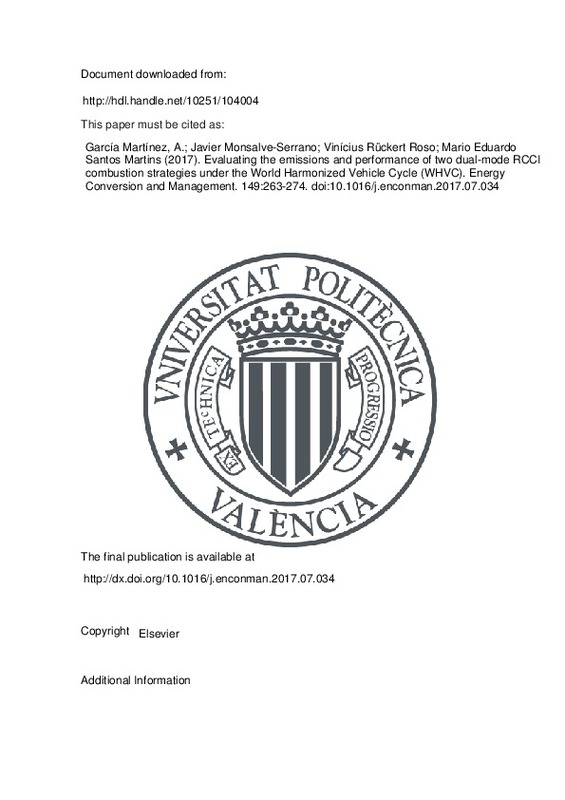JavaScript is disabled for your browser. Some features of this site may not work without it.
Buscar en RiuNet
Listar
Mi cuenta
Estadísticas
Ayuda RiuNet
Admin. UPV
Evaluating the emissions and performance of two dual-mode RCCI combustion strategies under the World Harmonized Vehicle Cycle (WHVC)
Mostrar el registro sencillo del ítem
Ficheros en el ítem
| dc.contributor.author | García Martínez, Antonio
|
es_ES |
| dc.contributor.author | Monsalve Serrano, Javier
|
es_ES |
| dc.contributor.author | Roso, Vinícius Rückert
|
es_ES |
| dc.contributor.author | Santos Martins, Mario Eduardo
|
es_ES |
| dc.date.accessioned | 2018-06-14T04:28:43Z | |
| dc.date.available | 2018-06-14T04:28:43Z | |
| dc.date.issued | 2017 | es_ES |
| dc.identifier.issn | 0196-8904 | es_ES |
| dc.identifier.uri | http://hdl.handle.net/10251/104004 | |
| dc.description.abstract | [EN] This work compares the emissions and performance of two dual-mode reactivity controlled compression ignition (RCCI) combustion strategies under the World Harmonized Vehicle Cycle (WHVC), a chassis dynamometer version of the World Harmonized Transient Cycle (WHTC) test proposed by the EURO VI emission regulation for heavy-duty engines. The major difference between the two dual-mode combustion strategies investigated is that, while one of them relies on covering with conventional diesel combustion (CDC) the part of the map that cannot be covered by RCCI regime (RCCI/CDC dual-mode), the other does it relying on dual-fuel diffusion combustion (dual-mode dual-fuel). The influence of the gear shifting strategy on the emissions and performance over the WHVC is discussed first. Later, both dual-mode concepts are compared considering the optimal gear shifting strategy. The results suggest that dual-mode dual-fuel concept allows reducing the specific fuel consumption by 7% in average versus RCCI/CDC concept. Moreover, NOx emissions are around 87% lower with dual mode dual-fuel, meeting the EURO VI requirements without the need for an SCR aftertreatment system. In counterpart, HC and CO emissions are near 2 and 10 times greater, respectively, for dual-mode dual fuel than for RCCI/CDC. (C) 2017 Elsevier Ltd. All rights reserved. | es_ES |
| dc.description.sponsorship | The experimental results used in this work come from an investigation funded by VOLVO Group Trucks Technology. The authors also acknowledge the Spanish economy and competitiveness ministry for partially supporting this research (HiReCo TRA2014-58870-R). The author J. Monsalve-Serrano acknowledges the financial support from the Universitat Politecnica de Valencia under the Grant "Ayudas Para la Contratacion de Doctores para el Acceso al Sistema Espafiol de Ciencia, Tecnologia e InnovaciOn". The author Vinicius Ruckert Roso would like to acknowledge the financial support from CAPES in providing the necessary bursary and to the Universidade Federal de Santa Maria and Universidade Federal de Minas Gerais-Brazil by the financial support in acquiring the software licenses needed for this work. | |
| dc.language | Inglés | es_ES |
| dc.publisher | Elsevier | es_ES |
| dc.relation.ispartof | Energy Conversion and Management | es_ES |
| dc.rights | Reconocimiento - No comercial - Sin obra derivada (by-nc-nd) | es_ES |
| dc.subject | Reactivity controlled compression ignition | es_ES |
| dc.subject | Dual-fuel combustion | es_ES |
| dc.subject | Dual-mode concept | es_ES |
| dc.subject | EURO VI emissions | es_ES |
| dc.subject | Engine cycle simulation | es_ES |
| dc.subject.classification | MAQUINAS Y MOTORES TERMICOS | es_ES |
| dc.title | Evaluating the emissions and performance of two dual-mode RCCI combustion strategies under the World Harmonized Vehicle Cycle (WHVC) | es_ES |
| dc.type | Artículo | es_ES |
| dc.identifier.doi | 10.1016/j.enconman.2017.07.034 | es_ES |
| dc.relation.projectID | info:eu-repo/grantAgreement/MINECO//TRA2014-58870-R/ES/REDUCCION DE LAS EMISIONES DE CO2 EN VEHICULOS PARA TRANSPORTE USANDO COMBUSTION DUAL NATURAL GAS-DIESEL/ | es_ES |
| dc.rights.accessRights | Abierto | es_ES |
| dc.date.embargoEndDate | 2019-10-01 | es_ES |
| dc.contributor.affiliation | Universitat Politècnica de València. Departamento de Máquinas y Motores Térmicos - Departament de Màquines i Motors Tèrmics | es_ES |
| dc.description.bibliographicCitation | García Martínez, A.; Monsalve Serrano, J.; Roso, VR.; Santos Martins, ME. (2017). Evaluating the emissions and performance of two dual-mode RCCI combustion strategies under the World Harmonized Vehicle Cycle (WHVC). Energy Conversion and Management. 149:263-274. https://doi.org/10.1016/j.enconman.2017.07.034 | es_ES |
| dc.description.accrualMethod | S | es_ES |
| dc.relation.publisherversion | http://dx.doi.org/10.1016/j.enconman.2017.07.034 | es_ES |
| dc.description.upvformatpinicio | 263 | es_ES |
| dc.description.upvformatpfin | 274 | es_ES |
| dc.type.version | info:eu-repo/semantics/publishedVersion | es_ES |
| dc.description.volume | 149 | es_ES |
| dc.relation.pasarela | S\341419 | es_ES |
| dc.contributor.funder | Ministerio de Economía y Competitividad | es_ES |







![[Cerrado]](/themes/UPV/images/candado.png)

